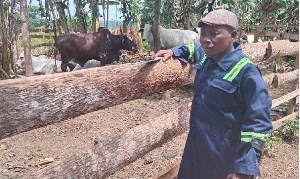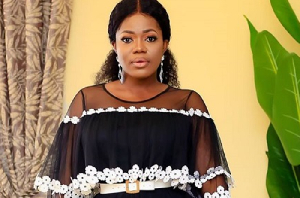More than 16 million children are married off globally each year with one per cent of them given out in marriage before age 15 and therefore need attention to end the practice.
To end this worrying trend which is prevalent in Asia and South Saharan Africa and in Ghana, the Domestic Violence Secretariat under the auspices of the Ministry of Gender, Children and Social Protection (MOGCSP) in collaboration with the United Nations Children Fund (UNICEF) has held a day's Regional Stakeholders Review Meeting in Cape Coast.
Mrs. Malonin Asibi, Head of the Domestic Violence Secretariat delivering on behalf of the (MOGCSP) said child marriage was a menace that affected the African Continent in many ways.
The negative effects included; illiteracy, poverty, diseases and under development and it will continue to affect the people if serious measures were not taken to end it.
Mrs. Asibi emphasized that the continuous practice of child marriage in Ghana could be attributed to the entrenched traditional and customary beliefs and misconstrued religious beliefs and practices, lack of formal education and ignorance about the effects on the development of girls. She said an erroneous belief by some parents that early marriage was the best way to protect their daughters and also increase their economic fortunes was unfortunate.
“The imagination exposes girls and families to increased health problems and violence, denies them access to social networks and support systems, and perpetuate a vicious cycle of poverty and gender inequality”.
She, explained that most girls married before their 18th Birthday were exposed to risks of sexual, physical, economical, emotional, and psychological violence in the hands of their ‘master husbands’ and appealed to parents to stop marrying off their children at tender ages.
She noted that stop child marriage, there was the need to fight sexual and gender-based violence since they were intertwined and thanked the UNFPA and UNICEF for their support and efforts in the fight against child marriage globally.
Mrs Asibi called on stakeholders to help bridge gaps that were hampering efforts at tackling the phenomenon, adding that her office would together with stakeholders ensure that the menace in Ghana was brought to the barest minimum.
Mrs. Joyce Odame, a representative from UNiCEP in her statement said one of its global transformational goals sought to bring to zero all forms of gender-based violence and harmful practices such as child marriage.
She said it was its shared responsibility to protect and empower young girls through advocacy for stronger laws, policies and equally important enforcement mechanisms to end child marriage so there was the need to address root causes of child marriage and agreed on how to tackle them.
Speaking on “Ending Child Marriage in Ghana. A Profile Of Progress”,Mrs Odame stated that stakeholders’ collective efforts had to be accelerated to minimize or eradicate child marriage from the society.
“We the need to pool resources together as stakeholders and maximize efforts to redraw a lot of girls whose lives were at risk in abusive marriages” she stressed.
She added that ideas must be shared at the community level to deal with the canker from its roots.
The meeting organized by the MOGCSP with funds from UNICEF brought together stakeholders from the National Commission on Civic Education (NCCE), Commission on Human Rights and Administrative Justice ( CHRAJ) and the Ghana Health Service.
Others are late Ghana Police Service, Religious and Traditional Leaders, Opinion Leaders, Assembly Members, the National Youth Authority, and the Department of Social Welfare.
General News of Saturday, 31 October 2020
Source: GNA













